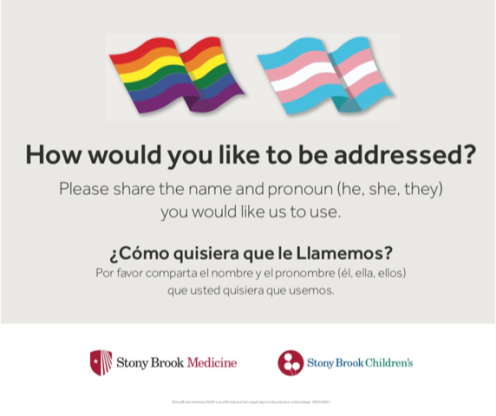
Stony Brook University Hospital (SBUH) was named an “LGBTQ+ Healthcare Equality Leader” for 2022 in the Human Rights Campaign Foundation’s 15th anniversary edition of the Healthcare Equality Index (HEI).
SBUH comprises a large array of healthcare facilities, including Stony Brook Children’s Hospital, Stony Brook Southampton Hospital (SBSH) and Stony Brook Eastern Long Island Hospital (SBELIH), all of which were awarded this distinction.
“We’re super proud of and excited to have all of our hospitals have this healthcare equality leader designation. In that way, we’re really covering our bases for Suffolk County and establishing an LGBTQ+ care footprint on Long Island,” Adam Gonzalez, the director of Behavioral Health at Stony Brook Medicine and a co-chair on The Stony Brook Medicine LGBTQ+ Committee, said.
However, according to some members of the LGBTQ+ community, such as Seth Jakob Jochum-Fuchs, a junior clinical psychology and visual arts major who identifies as a non-binary queer person, SBUH should not be named a leader in LGBTQ+ healthcare equality.
Jochum-Fuchs, who spent a week in March at the Stony Brook University Hospital following an on-campus medical emergency, said that there are a variety of other healthcare facilities that are more deserving of this designation than SBUH.
“I can think of several other places that deserve that title a lot more: the Mount Sinai Transgender Medical Health Clinic, Planned Parenthood of Smithtown – which is the only Planned Parenthood in Long Island that administers and prescribes testosterone – Callen Lorde, a hormone replacement therapy clinic and the Anti-Violence Project being just a few,” Jochum-Fuchs said.
In addition to Gonzalez, the Stony Brook Medicine LGBTQ+ Committee is co-chaired by Rose Cardin, director of Patient Education at Stony Brook University Hospital, and Allison Eliscu, chief of Adolescent Medicine at Stony Brook Children’s Hospital.
The committee is a multidisciplinary group of medical and behavioral health providers, nurses, students and education specialists, as well as representatives from human resources, information technology and hospital administration. Its mission is to review, address and affirm the specific and unique needs of LGBTQ+ individuals, as well as promote respectful and culturally-sensitive care to the LGBTQ+ community.
According to Eliscu, over the past three years, the committee has made multiple changes in clinical healthcare to increase the quality of culturally sensitive and gender affirming care.
These changes include setting up visible welcome signs at ambulatory sites, emergency rooms and registration desks with the pride and gender flags, as well as asking patients their preferred name and pronouns.
Changes were also made to the electronic medical record, with sections added for doctors to indicate a patient’s chosen name, preferred pronouns and sexual orientation or gender identity. The information is then saved for other providers within the same system to access.
Visitation policies were updated to ensure that when someone is admitted to the hospital, a same-sex partner can visit and help make medical decisions for them. Signage on bathrooms was also changed so that single stall restrooms were converted to all-gender facilities.
Finally, the LGTBQ+ committee arranged multiple lecture series for doctors, nurses, medical students, nutritionists, case managers and social workers in an effort to educate professionals across the board on the importance of providing gender-affirming care.
“Personally, as a gay, Hispanic, cisgender male, this work is really important,” Gonzalez said. “To be able to address healthcare for marginalized communities and to be able to look at different health disparities and ways that we can start addressing those disparities, is critical to being a good healthcare provider.”
However, Jochum-Fuchs does not believe these changes have truly increased the quality of care for people in the LGBTQ+ community.
Jochum-Fuchs reported that during their stay at SBUH, they were misgendered, referred to with incorrect pronouns, woken up to random body checks and were not always respected in regards to consent.
“I would not want to be in a situation like that again,” they said.
Dr. Eliscu assured that the changes SBUH has made have noticeably allowed LGBTQ+ patients to feel more comfortable.
“There was a patient that I met for just a routine wellness visit, and she admitted to me that she was very depressed and was having suicidal thoughts. I asked why she decided to disclose this, because she mentioned she had never talked about this before, and her answer was that she saw the rainbow ribbon that I wear on my ID badge,” Eliscu said.
The patient, who identified as a lesbian, felt safer talking about her experiences because she felt as though Eliscu would be more open and accepting of her.
Looking forward, the LGBTQ+ committee at Stony Brook medicine is committed to further increasing the quality of culturally sensitive and gender-affirming healthcare, despite the fact that they can’t reapply for the designation of LGBTQ+ Healthcare Equality Leader for another two years.
“We’re never really satisfied in our committee with staying put or maintaining the status quo,” Eliscu said. “We want to make sure that we’re continuing to make progress, even when we’re not actually applying for this designation.”
Although the committee has taken these new initiatives, more can always be done to properly address the needs of patients who identify as LGBTQ+.
“The opposite of love is not hate, it is ambivalence,” Jochum-Fuchs said. “Pride emblems are performative and therefore irrelevant. What is needed is not just non-transphobic, well-intentioned people. What is needed is medical staff that are specifically, actively and consistently pro-queer. A lot of work still needs to be done.”











